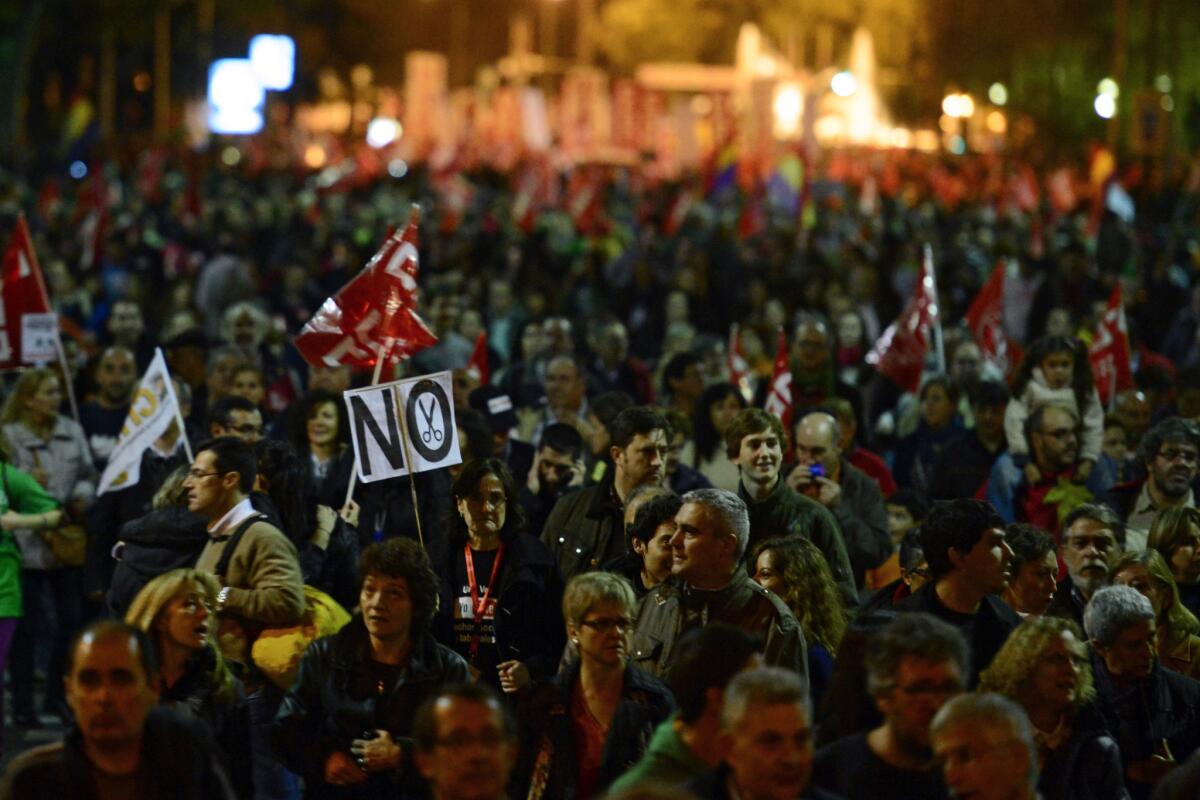Austerity measures are protested across southern Europe

- Share via
MADRID -- Millions of workers went on strike and joined anti-austerity protests throughout much of southern Europe on Wednesday, in the first joint labor action across countries suffering the worst of the continent’s debt crisis.
Workers walked off the job in Spain, Portugal, Italy and Greece, with smaller protests in France, Belgium and Cyprus.
Tens of thousands of people packed Madrid’s wide avenues, waving trade union flags and forming picket lines around shops that remained open. Riot police fired rubber bullets at demonstrators blocking traffic. More than 80 people were arrested and 34 injured, including 18 police officers. Videos emerged of police beating adolescent protesters in incidents in Valencia and Tarragona.
Elsewhere in the Spanish capital, thousands broke off from the main crowd and surrounded the Hospital Princesa, a public facility slated to be privatized as part of government austerity plans. Nurses swapped their white lab coats for red union T-shirts and joined the crowd, chanting: “Public healthcare!”
“We are very close to having this process [of privatization] reversed. And that’s because of the popular pressure in the streets,” said Gonzalo Wilhelmi, a 36-year-old railway worker. “It gives us hope.”
Most factories and many schools across Spain were empty Wednesday. Spanish unions put strike participation at 100% among industrial workers and 80% overall, though the government disputed those figures. In Madrid, subway trains and buses ran at about one-fifth of the normal service; hundreds of flights were canceled.
José Ricardo Martinez, president of the UGT union in Madrid, said some Spaniards went to work out of fear of losing their jobs. Up to one-third of the Spanish workforce is estimated to be on temporary contracts with little job security.
“In a country like Spain where you have nearly 6 million people unemployed, the rest feel a certain precariousness and insecurity,” Martinez said. “Many of those people could not participate in the strike for personal reasons, but they have joined protests after their work day.”
Spain’s Iberian neighbor, Portugal, was also hit by a mass strike, with protesters converging on Lisbon to express their anger over a shrinking economy and rising unemployment.
In Italy, anti-austerity demonstrators burned cars and blocked streets in Rome as riot police fired tear gas to disperse the crowds. Italian media reported officers injured in the cities of Turin, Milan and Naples.
And in Greece, where the euro debt crisis began three years ago, thousands of workers walked off the job for the fourth time in three weeks, taking to the streets of Athens to protest a fresh batch of budget cuts approved last week by the government to secure a $39-billion loan installment from international creditors. In contrast to previous demonstrations, the protest was peaceful; but it was noisy, with students banging on drums.
The three-hour strike, organized by Greece’s two biggest labor unions, affected both the public and private sectors. But as state agencies, government offices and public hospitals remained shut, many struggling shopkeepers refused to join in.
“We’re bleeding,” said a female employee at the Ianos bookstore in central Athens. “We’ve suffered enormously until now, and with such uncertainty looming, why risk losing more business or your job? It’s called survival.”
ALSO:
Israeli forces assassinate Hamas’ military chief
Before Obama visit, Cambodians clear streets -- or take to them
China’s Communist Party wraps up congress with little sign of reform
--Anthee Carassava in Athens and Sarah Delaney in Rome contributed to this report.
More to Read
Sign up for Essential California
The most important California stories and recommendations in your inbox every morning.
You may occasionally receive promotional content from the Los Angeles Times.










